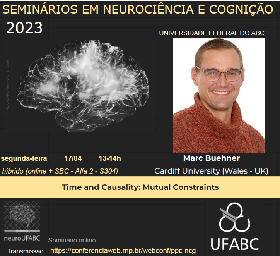PPGNCG
PÓS-GRADUAÇÃO EM NEUROCIÊNCIA E COGNIÇÃO
FUNDAÇÃO UNIVERSIDADE FEDERAL DO ABC
Telefone/Ramal: Não informado
E-mail:
ppgnc@ufabc.edu.br
http://propg.ufabc.edu.br/neuro
Seminários em Neurociência e Cognição - 2a 17/04: Marc Buehner (Cardiff University - Wales/UK) - Time and Causality: Mutual Constraints

| Data e hora: | 17/04/2023 | 13-14h |
| Palestrante: | Marc Buehner | |
| Sala: | híbrido (online + SBC - Alfa 2 - S304) | |
| Afiliação: | Cardiff University (Wales - UK) | |
| Título: | Time and Causality: Mutual Constraints | |
| Resumo: | A dominant view in contemporary cognitive science is that causal knowledge is extracted or inferred from sensory input that is in essence non-causal. Following David Hume’s empiricist stance, non-causal cues that give rise to causal impressions are i) the constant conjunction between putative cause and effect (also referred to as covariation or contingency), ii) the temporal priority of cause before effect, and iii) contiguity in space-time between cause and effect. Temporal priority has largely been taken for granted and has not received much attention in psychological research. Contiguity, on the other hand, has been investigated considerably, in frameworks of animal conditioning, cognitive neuroscience, and experimental psychology. The consensus across these areas of enquiry is that, everything else being equal, candidate causes that are more contiguous in time to their effects lead to stronger impressions of causality. Interestingly, the last two decades have revealed that the relationship between time and causality is bi-directional. Specifically, not only is it the case that temporal contiguity between two events leads to increased impressions of causality between them, but conversely, that when two events are believed to be causally linked, they mutually attract each other in time, leading to contraction of perceived interval lengths. Not only that, but in the domain of perceptual causality, causal beliefs can lead to reversals of perceived temporal order to bring in line sensory evidence with higher order causal beliefs. In this talk will give an overview of the research paradigms that investigated the mutual constraints between time and causality, and outline the beginnings of a journey that asks whether these constraints are driven by Bayesian principles. | |
| Bio: | Marc Buehner is a professor of cognitive psychology at Cardiff University in Wales, UK. His research focusses on how humans learn about, process, and perceive causality. His early work focussed on the question of how people derive causal conclusions from input that is inherently non-causal, for example how people make the mental leap from covariation to causation, and how contingency and temporal contiguity interact to guide causal inference. More recently, he has investigated the time-causality relation from the other direction: How knowledge of or belief in causality can influence our perception of time. In temporal binding, the perceived time between two events contracts when the first event caused the second, relative to when they are unrelated, and this effect occurs both in interval as well as in event timing. In temporal re-ordering, the human visual system re-orders (reverses) the subjective time of events to bring perception in line with higher order causal beliefs. Marc has gained his PhD at the University of Sheffield, England, and has trained at University of California, Los Angeles, and Universität Regensburg before that. | |
| Transmissão: | https://conferenciaweb.rnp.br/webconf/ppc-ncg | |
Notícia cadastrada em: 13/04/2023 17:47
SIGAA | UFABC - Núcleo de Tecnologia da Informação - ||||| | Copyright © 2006-2025 - UFRN - sigaa-2.ufabc.int.br.sigaa-2-prod




